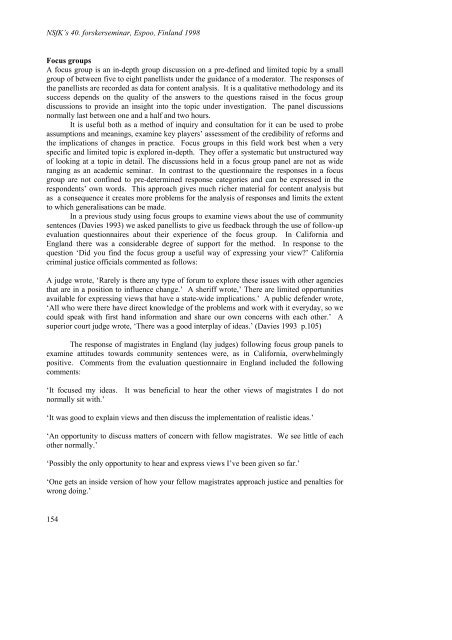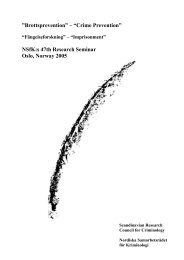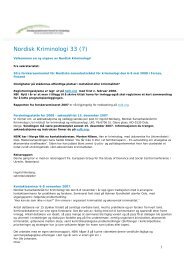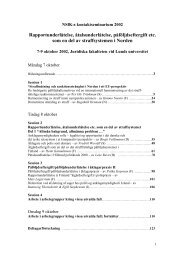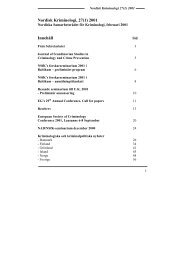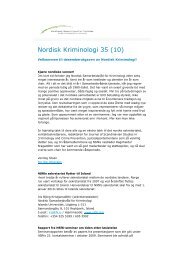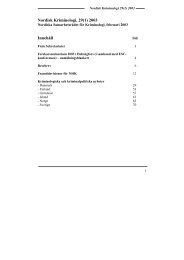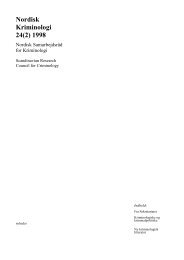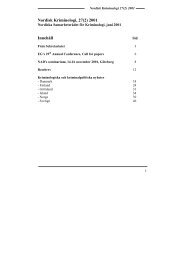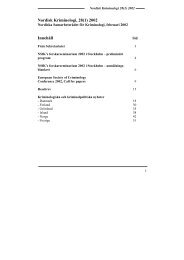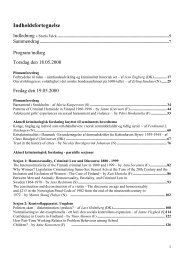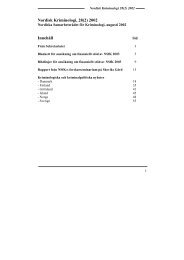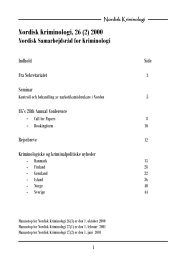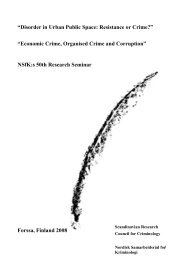Organised Crime & Crime Prevention - what works? - Scandinavian ...
Organised Crime & Crime Prevention - what works? - Scandinavian ...
Organised Crime & Crime Prevention - what works? - Scandinavian ...
Create successful ePaper yourself
Turn your PDF publications into a flip-book with our unique Google optimized e-Paper software.
NSfK’s 40. forskerseminar, Espoo, Finland 1998<br />
Focus groups<br />
A focus group is an in-depth group discussion on a pre-defined and limited topic by a small<br />
group of between five to eight panellists under the guidance of a moderator. The responses of<br />
the panellists are recorded as data for content analysis. It is a qualitative methodology and its<br />
success depends on the quality of the answers to the questions raised in the focus group<br />
discussions to provide an insight into the topic under investigation. The panel discussions<br />
normally last between one and a half and two hours.<br />
It is useful both as a method of inquiry and consultation for it can be used to probe<br />
assumptions and meanings, examine key players’ assessment of the credibility of reforms and<br />
the implications of changes in practice. Focus groups in this field work best when a very<br />
specific and limited topic is explored in-depth. They offer a systematic but unstructured way<br />
of looking at a topic in detail. The discussions held in a focus group panel are not as wide<br />
ranging as an academic seminar. In contrast to the questionnaire the responses in a focus<br />
group are not confined to pre-determined response categories and can be expressed in the<br />
respondents’ own words. This approach gives much richer material for content analysis but<br />
as a consequence it creates more problems for the analysis of responses and limits the extent<br />
to which generalisations can be made.<br />
In a previous study using focus groups to examine views about the use of community<br />
sentences (Davies 1993) we asked panellists to give us feedback through the use of follow-up<br />
evaluation questionnaires about their experience of the focus group. In California and<br />
England there was a considerable degree of support for the method. In response to the<br />
question ‘Did you find the focus group a useful way of expressing your view?’ California<br />
criminal justice officials commented as follows:<br />
A judge wrote, ‘Rarely is there any type of forum to explore these issues with other agencies<br />
that are in a position to influence change.’ A sheriff wrote,’ There are limited opportunities<br />
available for expressing views that have a state-wide implications.’ A public defender wrote,<br />
‘All who were there have direct knowledge of the problems and work with it everyday, so we<br />
could speak with first hand information and share our own concerns with each other.’ A<br />
superior court judge wrote, ‘There was a good interplay of ideas.’ (Davies 1993 p.105)<br />
The response of magistrates in England (lay judges) following focus group panels to<br />
examine attitudes towards community sentences were, as in California, overwhelmingly<br />
positive. Comments from the evaluation questionnaire in England included the following<br />
comments:<br />
‘It focused my ideas. It was beneficial to hear the other views of magistrates I do not<br />
normally sit with.’<br />
‘It was good to explain views and then discuss the implementation of realistic ideas.’<br />
‘An opportunity to discuss matters of concern with fellow magistrates. We see little of each<br />
other normally.’<br />
‘Possibly the only opportunity to hear and express views I’ve been given so far.’<br />
‘One gets an inside version of how your fellow magistrates approach justice and penalties for<br />
wrong doing.’<br />
154


